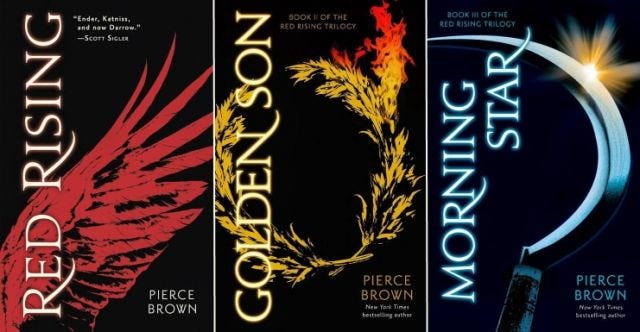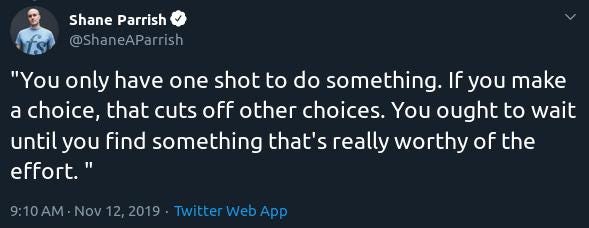Do the Opposite #38 - Changing The Paradigm, Financial Literacy, Idea Execution Is Everything, the 100% Rule
Good News Everyone!
Welcome to the newest issue of the Do the Opposite newsletter, sent every Monday! If you like it, please forward this email to your friends or share this link with them: tinyletter.com/dotheopposite - this helps the newsletter grow!
If you want to share any resources, articles, books or anything else with the community, please reply to this email with your recommendations!
_________
Changing The Paradigm
I've recently finished the first trilogy in the "Red Rising" saga by Pierce Brown. If you like sci-fi I definitely recommend reading it as it's incredibly good! It's about a society of near future where everyone lives in a caste system, with colors used to distinguish the different castes. The Gold are at the top, the Red are at the bottom, with all the different colors in between. I really enjoyed the author's deep understanding of psychology (seen best from the internal monologues of Darrow, the main character) and the books not being naive in any sense of the word, which was refreshing. For a proper synopsis, go here.
A recurring mental model in the series is "changing the paradigm". Whenever Darrow faces a situation that seems impossible for him to "win", to beat the odds, he knows he needs to "change the paradigm": to do something so unorthodox, unexpected and not-fitting the preconceptions of others of what he might do, that it tips the scales just enough to allow him to win. Forgive me for making it nerdier, but a good example of changing the paradigm is the "Kobayashi Maru" test from Star Trek, where (in short) Captain Kirk was given an impossible test to complete - a simulated test where there were 2 choices and both lead the ship to catastrophe, a true "no-win" situation. He was the first person to complete the test successfully: he did that by reprogramming the simulator itself. Now that's changing the paradigm!
Another example that comes to mind I think I've read in a book by Paul Arden (I might be wrong as I've read that story long ago). A group of art students is told to draw a portrait of themselves and are given an hour. The next week, they have to complete 2 self-portraits in an hour, and the next week after that - 3. By the time they have to do 3 in one hour the students barely have the time to finish the task but they still do, to the best of their abilities.
Then on the 4th week of the class they are told they need to produce 100 self-portraits in an hour. That seems impossible. And it is, in their previous approach of doing the same thing but faster. Now this exercise forces them to reconsider their approach altogether - to find a totally new scalable way of completing the task. One way might be to draw most of the features of the face first, then print 100 copies of the portrait and modify them a bit. There are however many more ways the students can solve the problem - but it won't be their old approach that gets them over the hump.
Think of how you might be putting yourself into a tunnel of pre-existing choices. For example: "Do I work for a company OR start a business?" Why not both? You can start a business as a side gig and not quit your job until it's profitable enough to sustain you and your family. There are more examples, of course, and I am sure some are forming in your head right now! Act on it! Kobayashi-Maru that sh*t! :)

Articles:
1) "Why We Choose Profit" by Jason Fried (of Basecamp)
Basecamp is a unique company that really does the opposite. When everyone else is focused on raising the money from investors and selling the company as soon as it reaches its maximum value, Basecamp is focusing on profitability. When others are focused on explosive growth and disruption, Jason and David (the founders) are intentionally keeping the size of the company small and don't try to reinvent the wheel every month. This article is a little window into the "opposite" type of thinking we all should cultivate.
2) "Ideas Are Just A Multiplier Of Execution" by Derek Sivers
I've shared this article before but I keep bumping into it. Don't be afraid to share your ideas or that someone will steal your idea because ideas are almost worthless without proper execution and the execution is everything. We often see companies taking the ideas that already existed and executing them so well that it blows our minds and makes these companies worth billions. Was Apple the first to create a mobile phone? No. Was the first iPhone a perfect execution on the "idea" of a mobile phone when it first came out? Absolutely. Was chat a new concept that Slack came up with? Not in the slightest. But they did it right. So if you have an idea that you worry is already been done before and there are multiple companies already in business with that same idea - maybe it's not that bad! Think about it - if there are companies around that idea already - that means there is a market for it! However, make sure your execution plan has a unique twist on that existing idea!
3) "What Will Dinner Look Like in 2029? Ten chefs cook their vision of the future." by Alan Sytsma
This is a sobering and somewhat enigmatic exploration on what food might looks like 10 years from now, considering the ongoing climate change and the changing trends and tastes of the public. Skim-worthy for sure! :)
Videos:
1) "Two Cents" Channel
I'm so glad I found this channel! It teaches basic financial literacy in short videos that are easy to understand and that cover very specific topics. I hope you enjoy it!
Videos to start with:
a) "How Eating Out Keeps You Poor"
b) "How To Save Money At The Supermarket"
c) "Why It's More Expensive To Be Poor"
2) "The 100 Percent Rule That Will Change Your Life" | Benjamin Hardy | TEDxKlagenfurt
This is a video I didn't expect too much from (I often watch TED talks and some of them don't leave an imprint so I've grown to be conservative in my expectations :) but it proved to be very useful. Benjamin shares the 100% rule with us: the idea is that 100% commitment is easier than 98% or less. You might know this concept by the name of "Bright Line Rules".
It's much more difficult for us to commit to long-term change if we are not 100% in it. Let's say you want to quit smoking, but you say to yourself: I will only smoke in case of an emergency or in some high stress situation. Then as life unfolds, stressful situations come up, and we constantly have to negotiate with ourselves whether the current stressful situation falls under the "I can allow myself a cigarette" type or not. The more we negotiate throughout the days and weeks, the higher the chance we run out of willpower and back-slide into our old ways. However, if we are to be a bit "maximalist" about it and we quit "cold-turkey" - there is a higher chance we will succeed. In Benjamin's words: "Once you make a decision you don't have to think about it ever again".
3) "Why I Left Millions in Banking to Inspire Millions Online" | Brian Rose | TEDxClapham
I've learnt about Brian by watching an interview he did with David Goggins. In this video, he shares the story of how he created his "London Real" business and brand. It was quite a rocky path, and some of the insights Brian gives us are invaluable to our own journeys of building our brands/companies/projects. (P.S. I was happy to learn that Brian is also inspired by Steven Pressfield's books as he talks about the concept of Resistance and his experience with it)
Tech Corner:
1) Interested in Node, React & React Native?
My friend and collaborator on #100DaysOfCode project (he built the #100DaysOfCode Twitter bot) Aman Mittal writes a weekly newsletter on the topics above. Aman has written more than 95 articles in the past 3 years alone! There are also some fun ones like this one: "Build a "Not Hotdog" clone with React Native" In his newsletter, he shares his own new posts as well as the best tech posts he finds!
SIGN UP for Aman's newsletter and improve your dev skills!
2) The State of Octoverse 2019
This is a report by GitHub, based on the data they collect from open source contributions. It includes info on the countries that contribute most to open source, the top programming languages used - and the change of their positions over time, the fastest growing programming languages, the most popular open source projects and much more. It's a fun skim-through!
Tweet that resonated with me

Ethos:

Quotes:
"For all of the most important things, the timing always sucks. Waiting for a good time to quit your job? The stars will never align and the traffic lights of life will never all be green at the same time. The universe doesn't conspire against you, but it doesn't go out of its way to line up the pins either. Conditions are never perfect. "Someday" is a disease that will take your dreams to the grave with you. Pro and con lists are just as bad. If it's important to you and you want to do it "eventually," just do it and correct course along the way."
― Timothy Ferriss, "The 4-Hour Workweek"
"It's lonely at the top. Ninety-nine percent of people in the world are convinced they are incapable of achieving great things, so they aim for the mediocre. The level of competition is thus fiercest for 'realistic' goals, paradoxically making them the most time and energy-consuming."
― Timothy Ferriss, "The 4-Hour Workweek"
_________
TELEGRAM CHANNEL: Do the Opposite has a public Telegram channel. The content there is a little different than in the newsletter: faster to consume, a bit more random - basically anything weird or interesting that catches my eye - articles, tweets, videos, images, etc. Hope to see you there as well! :) Here it is: t.me/dotheopposite
If you find this newsletter helpful, please consider forwarding this email to to your friends! Or just give them this link: tinyletter.com/dotheopposite
Keep doing the opposite,
Alex Kallaway
Website: dotheoppo.site
Twitter: twitter.com/ka11away

